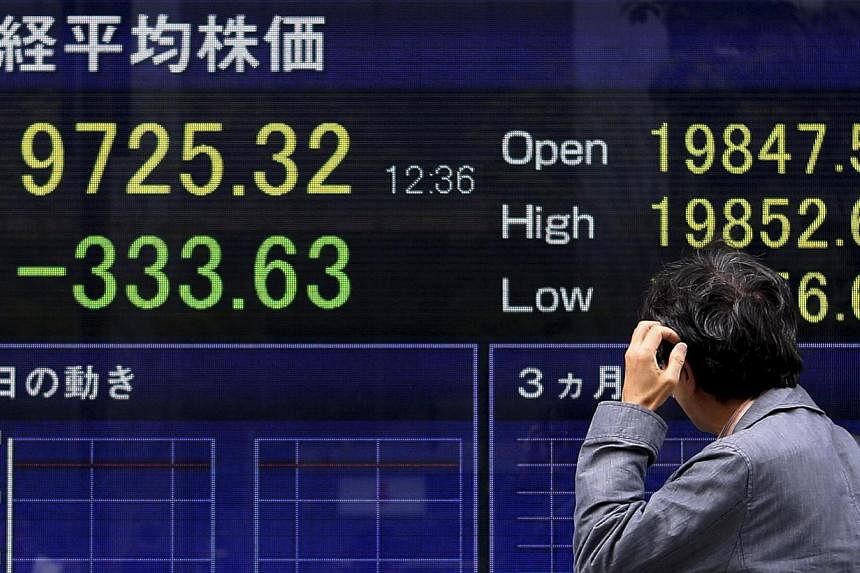WELLINGTON (Bloomberg) - Asian stocks and bonds retreated, extending a global rout, as Japan returned from a three-day holiday. Oil slipped after reaching its highest this year and precious metals fell with emerging currencies.
All major Asian stock gauges dropped by 12:14 p.m. in Tokyo, with Chinese shares sliding after Morgan Stanley ended its overweight call. The Straits Times Index was down 0.72 per cent at 3,434.89 as round 11:45am.
The yield on 10-year Japanese bonds jumped six basis points and the Topix index slid 0.6 per cent. Emerging currencies weakened versus the dollar as Vietnam devalued its dong for the second time this year.
About US$2 trillion has been wiped from the value of global equities and bonds since the start of last week amid signs of price stabilization in Europe, speculation over U.S. interest rates and on concern China's share market is overheated. Federal Reserve chair Janet Yellen said Wednesday that she sees potential danger in the rich valuations of both debt and stocks. Investors are waiting on U.S. employment reports Friday for clues to the strength of the world's largest economy.
"Risk-off moves could intensify if the U.S. economic situation is deemed weak," Mitsushige Akino, an executive officer at Ichiyoshi Asset Management Co. in Tokyo, said by phone. "Sentiment could sour even more depending on the April payrolls report. The U.S. economy was expected to bottom out in March and recover in the second quarter, but so far the figures for April have been poor."
Productivity in the U.S. fell in the first quarter, data Wednesday showed, while a private payrolls report showed companies added the fewest number of workers in more than a year last month. The Bloomberg ECO U.S. Surprise Index is at levels last seen during the financial crisis in 2009.
Ten-year Japanese bond yields climbed to 0.42 per cent, set for their highest close since March as the market catches up with the past three days of a global bond rout. Rates on similar maturity Treasuries were little changed at 2.25 per cent after surging 21 basis points through Wednesday from the end of April.
Australian 10-year rates rose 10 basis points to 3.02 per cent, with their eight-day climb matching the longest streak since February 2011. Rates on similar New Zealand notes advanced for a 14th day.
The Hang Seng China Enterprises Index, a gauge of mainland Chinese shares listed in Hong Kong, fell 0.6 per cent before trade data Friday that may show imports declined for a sixth straight month in April. The Shanghai Composite Index slumped 1.4 per cent, taking its three-day retreat to 7 percent.
The Kospi index in Seoul fell 1.4 per cent amid selling by foreign investors, while New Zealand's NZX 50 Index lost 0.9 per cent.
Australia's S&P/ASX 200 Index lost 1 per cent, bringing its three-day slump to 3.3 per cent. The Australian dollar climbed 0.4 per cent to 79.98 U.S. cents.
West Texas Intermediate crude rose to as high as US$62.58 a barrel Wednesday, the highest level since December, before paring its advance to end the session up 0.9 per cent. Brent oil dropped 0.8 per cent to US$67.25 a barrel Thursday following two days of gains.
U.S. crude stockpiles fell by 3.88 million barrels last week, according to the Energy Information Administration. Analysts surveyed by Bloomberg had predicted an increase in supplies. Refineries operated at the highest rate in four months as imports slipped to a one-year low.
South Korea's won dropped 0.7 per cent to 1,088.07 per dollar, and Malaysia's ringgit slipped 0.6 per cent to 3.59 to the greenback. Indonesia's rupiah, Turkey's lira and the Philippines peso weakened at least 0.2 per nt.
The pound was little changed at $1.5239 following two days of gains. Polls suggest that neither Conservative Prime Minister David Cameron nor his Labour Party opponent Ed Miliband will come close in Thursday's election to getting enough seats in Parliament to govern alone. Instead, they may face days or even weeks of talks to try to win over enough smaller parties to command a majority.

